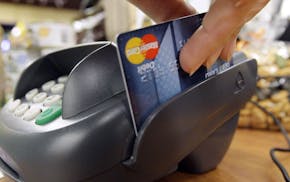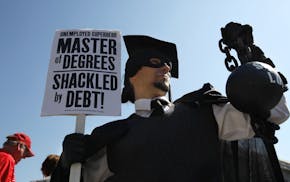Wall Street is already working on an early draft of Best Buy's obituary, and it goes something like this: The last remaining national electronics chain ultimately fell victim to discount retailers, consumers' preference for shopping online and its own inability to recognize that the world had changed.
It's nothing Best Buy's chief executive, Brian Dunn, or his predecessors haven't heard before. Forecasts of an imminent demise have been Best Buy's constant companion on its 45-year march to $50 billion in sales.
But betting against the blue-shirted gang out of Richfield usually proves to be a mistake. Best Buy is the consummate survivor, a relentlessly efficient merchant that's proven exceptionally adept at responding and adapting to consumer wants.
Best Buy shareholders may need to be patient. Dunn and his crew bet wrong on consumer appetite for 3-D and Internet-ready televisions, which led to a weak holiday season. That, combined with a hasty retreat from some foreign markets and a gloomy outlook for next year, have helped send Best Buy's stock price to a two-year low on Friday.
In Wall Street's estimation, Best Buy is neither learning from the challenges it faces nor changing fast enough. Their prescriptions range from lowering prices to compete more aggressively with the holy trinity of discounters -- Target, Costco and Wal-Mart -- to closing a lot of stores, and fast.
"I hear the drumbeat -- 'close hundreds of stores' -- which I think is utterly ridiculous," Dunn said Thursday. "Our stores are going to be as or even more relevant going into the future."
In the near future, though, the Big Box is giving way to the little one: Best Buy plans to open only eight or 10 U.S. stores in the current fiscal year, which ends in February 2012, but it will add almost 150 stand-alone Best Buy Mobile stores in the coming year, bringing the total to 312. The company is also expanding its online-only inventory of televisions and other products, and improving search functions and other capabilities on bestbuy.com, which rang up $2.5 billion in sales last year, an increase of 14 percent.
But the store remains central to Dunn's belief that it's the best place to show consumers how to get the most utility and enjoyment from the latest and greatest in technology. "The question we're asking is, 'What can we do for our customers that nobody else can?'"
He's learning some answers to those questions at 30 stores in Pittsburgh and Las Vegas that are serving as a laboratory of sorts for experiments with physical layout and less obvious systems and processes.
These "connected stores" feature a central aisle displaying the newest products. The showroom floor is less cluttered, and the space has been reconfigured into more clearly defined "experience zones" along key product lines, such as smartphones and home theater. Store staff have been trained across multiple categories, with an emphasis on being able to show how the devices can be connected to share, transfer or display content, what Dunn likes to call "demonstrating the art of what's possible."
Some stores are also using partitions to shrink the showroom floor by as much as 10,000 square feet, and one option would be to sublease that space to other retailers. "You would be amazed at the number of inquiries we get from other retailers that would love to be next door to us," Dunn said.
The early results are encouraging, Dunn said, with most of the stores performing far better than they did before being converted to concept stores last fall. Some innovations, such as touch-screen kiosks that allow people to shop on bestbuy.com, will begin to appear in stores later this year.
Best Buy may be too big to reinvent itself, but the company has an uncanny knack for adjusting its business model in response to or in anticipation of consumer needs. Two recent, powerful examples include the Geek Squad purchase in fiscal 2003 and the unveiling of Best Buy Mobile.
Both have helped power Best Buy's sales and profits in recent years, but much of the investment community initially greeted those developments with a shrug or outright skepticism. Why, they asked, would consumers pay extra for someone to hook up their computer? Why wouldn't a consumer just buy their phone from a carrier?
History means little on Wall Street, though. Nearly two-thirds of the analysts who follow Best Buy have assigned its stock a "hold" or "neutral" rating, which is really just a polite way of saying, "sell with both hands!"
Consumer electronics is a brutally tough business even in good times. Fleeting product cycles, falling prices and ever-changing consumer whims have proved a fatal mix for many retailers. That's one reason why the companies that were supposed to be Best Buy's undoing -- from Highland Superstores to Circuit City -- live on only in Wikipedia, if at all.
ericw@startribune.com • 612-673-1736

Wieffering: Time to get over debit card fees
For Thrivent and others, warnings were there

With billions in sales, some co-ops are big business
